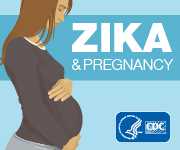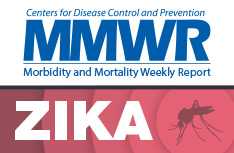Patient Counseling
People Planning to Conceive
Before Travel to areas with Risk of Zika
Healthcare providers should counsel [PDF – 173 KB] women and men considering or planning for pregnancy about travel to areas with risk of Zika virus infection. Consideration should be given to the health risks and and potential consequences of Zika virus infection around the time of conception and during pregnancy as well as a discussion of the patient’s individual circumstances, level of risk tolerance, and plans for having children.
Following Travel to Areas with Risk of Zika
Remind patients that most people infected with Zika remain asymptomatic.
- If a couple has a female partner and only she travels to an area with risk of Zika: before trying to get pregnant, the couple should consider waiting at least 2 months after the date of her last possible Zika virus exposure or 2 months after the start of her symptoms of Zika virus disease (if symptomatic).
- If a couple has a male partner and only he travels to an area with risk of Zika: before trying to conceive, the couple should consider waiting at least 6 months after the date of his last possible Zika virus exposure or 6 months after the start of his symptoms of Zika virus disease (if symptomatic).
- If a female and male couple travel together to an area with risk of Zika: before trying to conceive, the couple should consider waiting at least 6 months after the date of their last possible Zika virus exposure or 6 months after the start of his symptoms of Zika virus disease (if symptomatic).
- In addition to a discussion about waiting to conceive, couples should also be counseled about correctly and consistently using condoms to prevent the sexual spread of Zika virus during the waiting period. Condoms should be used during vaginal, anal, oral sex, and the sharing of sex toys. Condoms may be used as a method of birth control alone or in addition to a couple’s chosen method of birth control. Couples may also choose not to have sex during the waiting period.
Zika virus testing is indicated for all travelers to areas with risk of Zika who experience symptoms of Zika virus disease. This includes non-pregnant women and men.
Patients with Ongoing Exposure to Areas in the US with risk of Zika
Ongoing exposure means living in or frequently traveling to (e.g., daily or weekly) an area with risk of Zika. Given the ongoing possible exposure to Zika, healthcare providers should counsel women and men about how they can protect themselves against Zika, the potential consequences of becoming infected with Zika around the time of conception and during pregnancy, and their individual circumstances.
- Symptomatic non-pregnant women and men: Zika virus testing is indicated for non-pregnant women and men who live in or frequently travel to areas with a CDC Zika travel notice and who have symptoms of Zika. Those who test positive for Zika should follow the suggested timeframes above before trying to conceive.
- Asymptomatic non-pregnant women planning to conceive: CDC previously issued a recommendation to consider Zika virus IgM testing as part of preconception counseling to establish baseline IgM results before pregnancy for asymptomatic non-pregnant women with ongoing possible exposure who are planning to conceive (HAN, May 5, 2017). However, testing for such a purpose is no longer warranted given that Zika virus IgM is no longer routinely recommended for asymptomatic pregnant women.
People Not Planning to Conceive
Men and women should use condoms correctly and consistently for vaginal, anal, and oral sex and while using sex toys in addition to their chosen birth control method, or abstain from sex if they are concerned about the possibility of transmitting Zika virus to their sex partners. People who live in or travel to areas with risk of Zika should be informed that Zika can be passed through sex, even if the infected person does not have symptoms at the time. The virus may also be passed through sex by a person who has been infected with the virus but never develops symptoms.
Patients should be counseled about contraceptive methods, including the availability and effectiveness of different contraceptive methods and how to use these methods. The decision about what type of contraceptive method to use is a personal decision and should be made by the person or couple in consultation with their healthcare provider.
Persistence of Zika in Semen
CDC is aware of reports of Zika virus RNA detected in semen more than 90 days after symptoms began, with the longest report at 188 days. However, it’s unknown whether Zika virus RNA in the semen represents infectious virus. To date, Zika virus has been cultured (shown to be infectious) from semen collected within 3 months after symptoms started. There have also been reports of men without symptoms who are infected with Zika transmitting Zika virus to their partners through sex. Without definitive data showing a difference in the risk for men with and without symptoms to spread Zika through sex, the recommendations are the same for both groups.
Given the limited information available at this time and the potential for severe birth defects from congenital Zika infection, CDC recommends men wait 6 months before attempting pregnancy with their partner. This recommendation will be updated as new data become available.
Clinician Resources
Preconception Counseling Guide for Men and Women Living in Areas with a CDC Zika Travel Notice Who are Interested in Conceiving
Counseling Travelers: Women and Men of Reproductive Age
More Information
- HAN Advisory: Prolonged IgM Antibody Response in People Infected with Zika Virus: Implications for Interpreting Serologic Testing Results for Pregnant Women (May 5, 2017)
- Interim Guidance for Preconception Counseling and Prevention of Sexual Transmission of Zika Virus for Persons with Possible Zika Virus Exposure – United States, September 2016 (Sept. 30, 2016)
- HAN Advisory: Recognizing, Managing, and Reporting Zika Virus Infections in Travelers Returning from Central America, South America, the Caribbean, and Mexico (HAN, Jan. 15, 2016)
- Page last reviewed: August 30, 2017
- Page last updated: August 30, 2017
- Content source:





 ShareCompartir
ShareCompartir